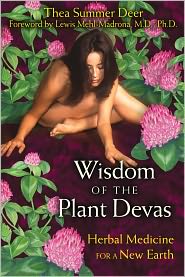
The majority of books on herbalism tend toward physical medicines: take such and such herb for a cold, another for a fever, a third to get rid of a headache. A number are also dedicated to spiritual correspondences for the herbs and other plants; Cunningham’s classic Encyclopedia of Magical Herbs is a good example. These usually deal more with herbs as raw materials, unfeeling and unconscious. Wisdom of the Plant Devas, however, takes a different approach: herbalism as a way of dealing with plants as spiritual, conscious beings.
The concept of devas, of course, is nothing new. The 19th century Theosophists appropriated the term from Hinduism and Buddhisms, changing it from a fairly specific set of definitions, to applying it to any nature spirit whatsoever—especially plants. And it is this latter, newer tradition that the author draws on. The book could also be considered plant totemism, as it deals with archetypal representations of entire species or types of plant.
Much of the book is dedicated to in-depth explorations of thirteen plants, ranging from borage to red clover to uva ursi. Each section for a plant explores historical meanings and uses of the plant, a “divination” for starting to get in touch with its deva, and several paragraphs of messages from the deva channeled by the author. The purpose is to give the reader an in-road for learning to talk to devas and then develop further communication with them.
On the plus side, it’s a really unique approach to herbalism and plant work in general. Plant totems don’t get nearly as much attention as animal totems, and this could be a really useful text for someone wanting to expand beyond the critters into other areas of nature spirituality. While there are snippets and bits of medicinal properties of the plants discussed, this should be seen as more of s spiritual and meditative guide than a medicinal handbook.
It is rather on the white-light end of things, being more about positive messages and healing. (The author even invokes the Law of Attraction, which I find to be one of the most heinous glossings-over of cause and effect out there.) She also engages in some cultural appropriation; the spiritual space in which one may meet the devas is described as a “Medicine Wheel Garden”, tossing together elements of various Native American cultures along with Buddhism and a generous dose of New Agery.
Still, overall it’s a useful book, if for no other reason than to bring a refreshing approach to nature spirituality as experienced in conjunction with plant spirits. If you can overlook the little bits of fluff here and there, it’s a good model for deepening relationships with plant totems and other spirits.
~review by Lupa
Author: Thea Summer Deer
Bear and Company, 2011
206 pages, $16.00
